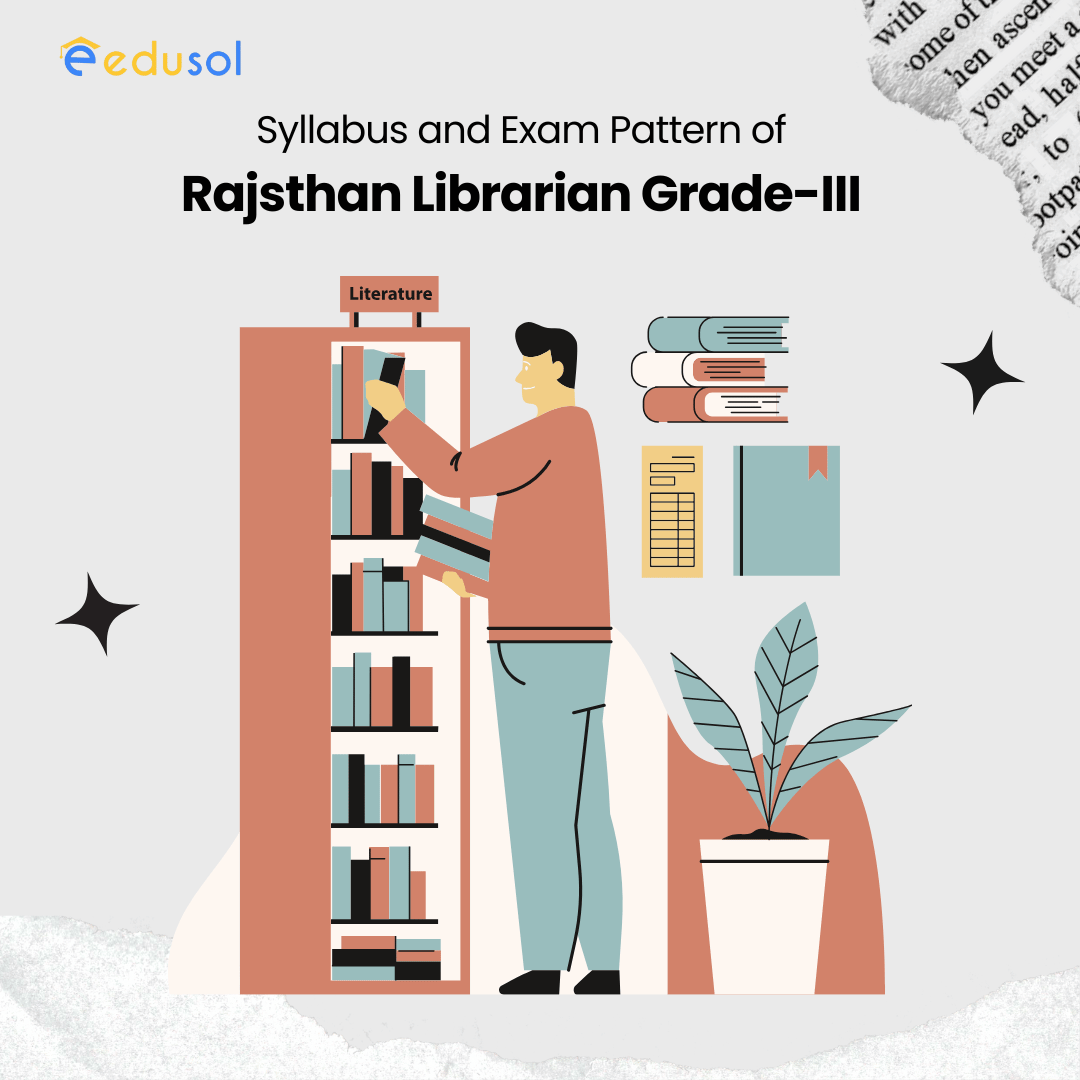The Rajasthan Librarian Grade-III Exam is conducted by the Rajasthan Staff Selection Board (RSMSSB) to recruit candidates for Librarian Grade-III positions in various departments, such as the Secondary Education Department and Sanskrit Education Department. Below is a detailed breakdown of the exam pattern and syllabus based on the most recent recruitment notification (e.g., Notification No. 18/2024 for 548 posts) and typical patterns for this exam. Since the current date is April 03, 2025, this information aligns with the 2025 recruitment cycle, specifically the exam scheduled for July 27, 2025. For precise details, candidates should refer to the official RSMSSB website (rsmssb.rajasthan.gov.in) once the syllabus is updated.
Exam Pattern for Rajasthan Librarian Grade-III Exam
The Rajasthan Librarian Grade-III Exam is a Computer-Based Test (CBT) consisting of two papers designed to assess candidates’ general knowledge and expertise in Library and Information Science. Here’s the detailed exam pattern:
- Mode of Exam: Online (CBT)
- Total Marks: 400
- Number of Papers: 2 (Paper I and Paper II)
- Duration: 2 hours per paper (total 4 hours)
- Total Questions: 200 (100 questions per paper)
- Question Type: Multiple Choice Questions (MCQs)
- Marking Scheme:
- Each question carries 2 marks.
- Total marks per paper: 200.
- Negative marking: 1/3rd mark (0.33 marks) deducted for each wrong answer.
- Minimum Qualifying Marks:
- 40% for general candidates.
- 35% for candidates from Scheduled Castes (SC) and Scheduled Tribes (ST).
- Language: Bilingual (English and Hindi)
Section-Wise Breakdown
| Paper | Sections | Questions | Marks | Duration |
|---|---|---|---|---|
| Paper I | General Knowledge | 100 | 200 | 2 hours |
| Paper II | Library and Information Science | 100 | 200 | 2 hours |
| Total | 200 | 400 | 4 hours |

Selection Process
- Written Exam (CBT): Candidates must clear both Paper I and Paper II.
- Document Verification: Candidates who qualify the written exam are called for document verification.
- Final Merit List: Based on CBT scores, subject to successful document verification.
Detailed Syllabus for Rajasthan Librarian Grade-III Exam
Paper I: General Knowledge (200 Marks)
This paper tests candidates’ awareness of Rajasthan’s geography, history, culture, current affairs, and general knowledge of India and the world, along with educational psychology. The syllabus includes:
- Geographical, Historical, Cultural, and General Knowledge of Rajasthan:
- Physical features: Climate, drainage, vegetation, agriculture, livestock.
- Historical events: Ancient civilizations (Kalibangan, Ahar), major dynasties (Gurjar Pratihars, Chauhans), Mughal-Rajput relations, freedom struggle (1857 revolt, Prajamandal movements).
- Cultural heritage: Folk music, dance, fairs, festivals, customs, dresses, ornaments, architecture (forts, temples, palaces), paintings, literature, and language.
- Political and administrative system: Governor, Chief Minister, State Secretariat, Rajasthan Public Service Commission, Panchayati Raj, State Legislative Assembly.
- Economy: Industries, tourism, population distribution, literacy, sex ratio.
- Current Affairs of Rajasthan:
- Major socio-economic developments, political events, games, and sports in the state.
- Recent government schemes and initiatives.
- General Knowledge of World and India:
- Continents, oceans, global wind systems, environmental issues, globalization.
- Indian geography: Physical features, monsoon system, drainage, vegetation, energy resources.
- Indian economy: Agriculture, industry, service sector, foreign trade.
- Indian Constitution: Key features, historical context (Government of India Acts 1919 and 1935), Gandhi’s contributions.
- International organizations and current global events.
- Educational Psychology:
- Learning theories and principles.
- Child development and psychology.
- Teaching methods and motivation.
- Individual differences and classroom management.
Paper II: Library and Information Science (200 Marks)
This paper focuses on core concepts of librarianship, including library management, knowledge organization, information technology, and services. The syllabus includes:
- Library as a Social Institution:
- Role of libraries in society and education.
- Types of libraries: Public, academic, special.
- Development of libraries in India: National Library of India, National Digital Library of India (NDLI).
- Five Laws of Library Science (S.R. Ranganathan) and their implications.
- Library legislation in India: Features, need, and efforts.
- Copyright Act, Delivery of Books Act, Intellectual Property Rights (IPR).
- Library associations: ILA, IASLIC, IFLA, ALA.
- Role of Raja Rammohan Roy Library Foundation (RRRLF).
- Knowledge Organization:
- Universe of knowledge: Structure, attributes, modes of formation of subjects.
- Classification schemes: Dewey Decimal Classification (DDC), Universal Decimal Classification (UDC), Colon Classification (CC).
- Cataloguing: AACR2, RDA, MARC standards, ISBD.
- Subject indexing and thesaurus.
- Library Management:
- Principles and functions of management in libraries.
- Collection development: Selection, acquisition, weeding out.
- Library operations: Circulation (charging/discharging), serial control, stock verification.
- Budgeting and financial management.
- Library personnel: Job roles, job analysis, job satisfaction.
- Information Sources and Services:
- Types of sources: Documentary (primary, secondary, tertiary), non-documentary.
- E-resources: E-books, e-journals, databases.
- Reference services: Short-range and long-range, qualities of a reference librarian.
- Information services: Document delivery, interlibrary loan (ILL), CAS, SDI, abstracting, indexing, translation, literature search.
- Information Technology in Libraries:
- Library automation: Software (e.g., KOHA, LIBSYS).
- Digital libraries and institutional repositories.
- Library networks: INFLIBNET, DELNET, OCLC.
- Basics of computers: Hardware, software, internet, database searching.
- Emerging trends: AI, cloud computing in libraries.
- Research and Technical Services:
- Research methods in library science.
- Bibliometrics, scientometrics, informetrics.
- Preservation and conservation techniques.
Key Notes
- Negative Marking: A deduction of 1/3rd mark applies for each incorrect answer or multiple answers to a single question. If no option is selected, it’s also considered a wrong answer.
- Answer Sheet: Candidates must use a blue ballpoint pen to mark answers on the OMR sheet, selecting one of five options (A, B, C, D, E). For unattempted questions, option E must be marked.
- Normalization: If the exam is conducted in multiple shifts, a normalization process may be applied to ensure fairness.
Preparation Tips
- Focus on Library Science: Paper II (200 marks) is subject-specific and critical for scoring high.
- Rajasthan GK: Prioritize Rajasthan-related topics in Paper I, as they form a significant portion.
- Practice MCQs: Solve previous years’ papers and mock tests to manage time and avoid negative marking.
- Stay Updated: Follow current affairs (especially Rajasthan-specific) through newspapers and official portals.
- Technical Skills: Brush up on library software, classification systems, and cataloguing standards.


